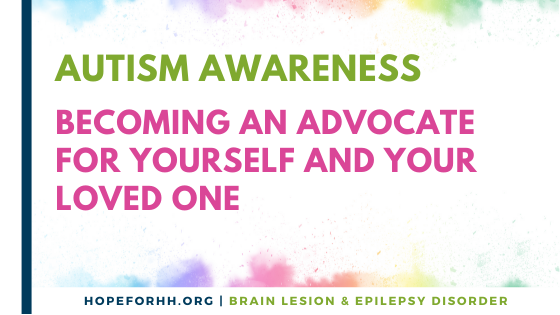
Becoming an Advocate
Let’s start by defining an advocate. An advocate is someone who raises awareness, pushes for change, and makes facts known for those who are not fully being heard. When your loved one is diagnosed with autism, it is essential that you advocate for them to help their voices be heard.
In my experience of being an advocate and seeing others advocate for their loved ones, we are the closest to them. I always say that I am my son’s “person.” When you’re an advocate for someone, you have a special bond with them and know them best. My son could make a hand gesture a certain way and I could tell you how he is feeling or what he is looking for. If he is behaving out of the “norm,” I would be able to explain that this probably is not him being fresh, but more that he is in sensory overload or just needs a few minutes to himself.
I have found some physicians overlooking other possible medical diagnoses related to Hypothalamic Hamartoma Syndrome because they assume the behavior that they are observing is related to autism. This is when being an advocate is important. You may have heard once, twice, or even more, “Well, that just sounds like autistic behavior.” But I make sure that just because my son is autistic does not mean all his symptoms are immediately assumed to be autistic behavior. Although it is not always my favorite going head-to-head with other loved ones, physicians, or professionals; as his advocate, it NEEDS to be done. In many cases, some overlap can occur between characteristics of HH and ASD, as well as other conditions. An example of this is how my son obsessively seeks out water consumption (not juice, not soda, ONLY water). He tries to drink the bathwater every time, steals others’ drinks if it is water, has gone into the toilet, and has even taken sips from a fish tank. When I brought this up to his provider, he stated that it sounds like “autistic behavior” BUT with his diagnosis of hypothalamic hamartoma, he could be behaving this way due to diabetes insipidus which can go hand in hand with hypothalamic hamartomas. Fortunately, in this situation, his physicians took it seriously and did the testing they needed to do. (To further read about how HH and Autism characteristics overlap, click here.)
When someone has a deep cut, it’s easy to say that they may need stitches, and something is wrong. However, if someone looks okay on the outside but is non-verbal or has difficulty communicating their needs, you may not know what is going on deep down. It is so important to take that leap and always stand up to communicate what they are having trouble saying. For someone without autism who does not like the texture of wearing jeans, they can say, “Well I don’t prefer wearing jeans because they make me feel itchy.” But someone with autism who has difficulty communicating how they are feeling, it could make them have a dreadful day and act out to try to help self soothe themselves. Also, what may feel itchy to us, may feel like little, tiny needles poking all over their legs or ants crawling up and down to them. By acting and speaking up for them, this could change their world.
Why advocate? Well as Dr. Seuss once said in The Lorax, “Unless someone like you care a whole awful lot, nothing is going to get better. It is not.” Please be their advocate and let them be heard.

Read our previous blogs from our Autism Awareness Series
- First Signs of Autism Spectrum Disorder in an Individual with Hypothalamic Hamartoma Syndrome
- Differential Diagnosis for those with Hypothalamic Hamartoma Syndrome and autistic characteristics
- Overlapping Characteristics of Hypothalamic Hamartoma Syndrome and Autism Spectrum Disorder
- Parenting from Different Points of View
- Coming to terms with a Rare Disease diagnosis and Autism
Read more about Kristy and Brett:





